january-top.html
1814 Aubrey Thomas de Vere was born on this day in County Limerick in 1814. He was a widely respected poet of his time. He helped the Celtic revival encouraging the study of Celtic legend and Celtic literature.
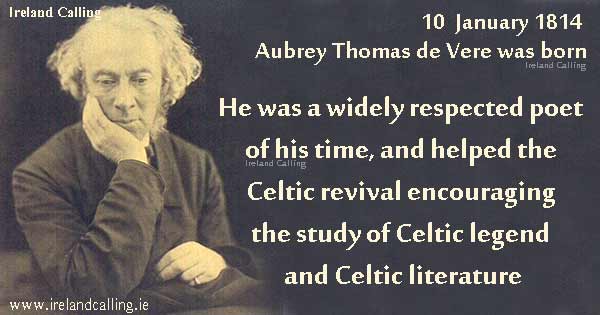
He wrote with a sensitive understanding of the Irish character. His poetry shows serious and religious commitment, and he wrote many devotional verses.
Click for the full poem

* * *
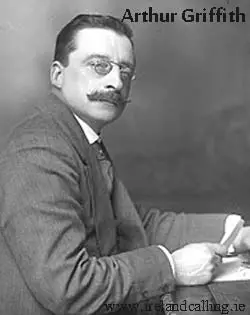 1922 Arthur Griffith became the second president in Ireland’s history on this day in 1922 (Éamon de Valera’s resigned the previous day, 9 January). He was the founder and then leader of political party Sinn Féin. Griffith was a nationalist and led the Irish negotiations over the Anglo-Irish Treaty. He attended the talks with Michael Collins who was assassinated as a result of the agreement.
1922 Arthur Griffith became the second president in Ireland’s history on this day in 1922 (Éamon de Valera’s resigned the previous day, 9 January). He was the founder and then leader of political party Sinn Féin. Griffith was a nationalist and led the Irish negotiations over the Anglo-Irish Treaty. He attended the talks with Michael Collins who was assassinated as a result of the agreement.
Just prior to the Dáil electing Arthur Griffith President of the Provisional Government, and Michael Collins Minister for Finance, Michael Collins gave this speech;
“The Irish nation at the present moment is a ship without a captain, and a ship, we all know, cannot get on without a captain. I want to move this motion so that we may have some captain for the ship.
I saw a thing happening down at home years ago that I can illustrate my remarks with, I think, in an apt way. I remember one day passing along the road and I saw two horses standing in a field with a plough behind them, and there was no ploughman. I watched that thing for about two hours, and the ploughman was still absent. The horses that were able to plough were idle—there was no ploughman between the handles. There was no work done.
Now, a bad ploughman is better than no ploughman, and the Irish nation is watching us at the present moment; in the same way as I watched that scene they are watching us. They see the horses idle, the plough idle; they see that we are doing nothing at all; they see that we are not taking action to put any sort of ploughman between the handles. I knew where the ploughman was. He was in some place wasting his time. We are very much before the Irish nation at the present moment in the position of that ploughman.”
Éamon de Valera replied; “As a protest against the election as President of the Irish Republic of the Chairman of the Delegation, who is bound by the Treaty conditions to set up a State which is to subvert the Republic, and who, in the interim period, instead of using the office as it should be used—to support the Republic—will, of necessity, have to be taking action which will tend to its destruction, I, while this vote is being taken, as one, am going to leave the House.”
Éamon de Valera then left the Dáil Éireann with 56 of his supporters. The official Dáil record shows that heckling continued for a good while.
Mr. M Collins: Deserters all! We will now call on the Irish people to rally to us. Deserters all!
Mr. D Ceannt: Up the Republic!
Mr. M Collins: Deserters all to the Irish nation in her hour of trial. We will stand by her.
Madame Markievicz: Oath breakers and cowards.
Mr. M Collins: Foreigners— Americans—English.
Madame Markievicz: Lloyd Georgeites.
* * *
1941 Sir John Lavery died. He was an Irish painter best known for his portraits. He supported the Irish War of Independence and the Irish Civil War, and allowed the Irish negotiators to use his London home during the negotiations leading to the Anglo-Irish Treaty.
After Michael Collins was assassinated, he painted Michael Collins (Love of Ireland).
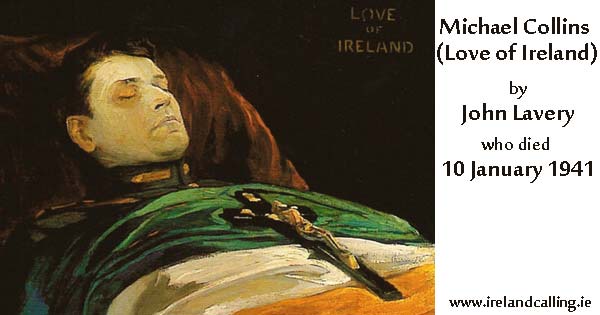
* * *
1952 Irish airline, Aer Lingus plane, St Kevin, crashed in Wales killing 23 people on this day in 1952.
* * *
2000 The Lodge and Spa at Inchydoney Island, Clonakilty, County Cork, was named winner of the prestigious hospitality award, the AA Hotel of the Year on this day in 2000.
Click here to read about some of the top holiday attractions in Cork
* * *
2003 On this day in 2003, Ulster loyalist Johnny ‘mad dog’ Adair is released from prison but swiftly sent back after attacking his ex-wife.
In 2002, he was forced to leave Northern Ireland in fear of his life after his expulsion from paramilitary group, the Ulster Defence Association.
* * *
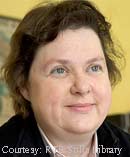 2012 On January 10 2012, Mary Raftery died. She was an investigative journalist and documentary-maker who worked for RTÉ. In 1999, she worked on the documentaries ‘States of Fear’ a series that showed the level of physical and sexual abuse that children in the Irish care system experienced between the 1930s and 1970s. In 2002, she produced ‘Prime Time Investigates: Cardinal Secrets’ – this led to the setting up of the Murphy Commission of Investigation, which investigated child sex abuse in the Dublin Archdiocese.
2012 On January 10 2012, Mary Raftery died. She was an investigative journalist and documentary-maker who worked for RTÉ. In 1999, she worked on the documentaries ‘States of Fear’ a series that showed the level of physical and sexual abuse that children in the Irish care system experienced between the 1930s and 1970s. In 2002, she produced ‘Prime Time Investigates: Cardinal Secrets’ – this led to the setting up of the Murphy Commission of Investigation, which investigated child sex abuse in the Dublin Archdiocese.
Colm O’Gorman of Amnesty International Ireland said, “Without the work that Mary did as a journalist (on the abuse of children), I don’t think much of this would have surfaced.” He felt that Raftery’s work transformed Ireland.
The Mary Raftery Journalism Fund has been set up to encourage in-depth investigation into areas of Irish society where injustices may exist, eg. mental health, migrant issues and children’s rights.
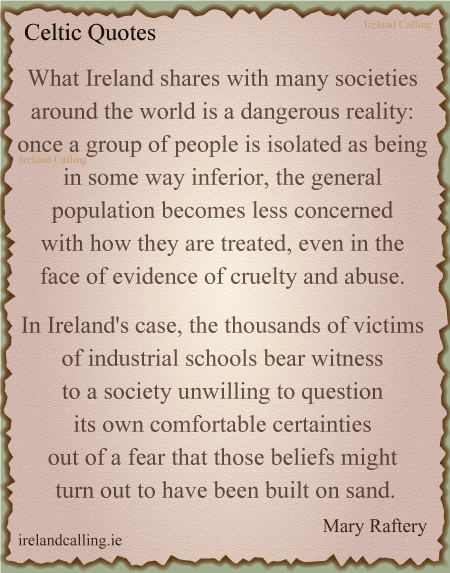
* * *
january-bottom.html